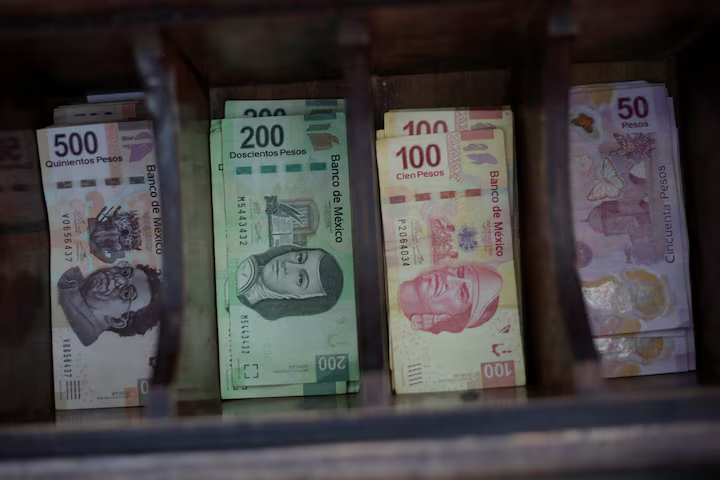Stocks of the Mexican peso plunge on fear that the ruling coalition will have a supermajority in Congress
Karin Strohecker, Rodrigo Campos
04/06/2024
LONDON/NEW YORK (Reuters), June 3, 2016 – Mexican stocks dropped over 6% and the peso was at its lowest level against the dollar since November. The country’s ruling parties scored a surprising strong election result, and appeared poised to gain a supermajority in Congress. Markets fear that this could lead to constitutional changes and a reduction of checks and balances.
As expected, Claudia Sheinbaum was declared the winner of Sunday’s presidential elections with a overwhelming victory. The scale of the Morena Party’s and its allies’ gains surprised the markets, as some feared that the results could pave the way to the ruling coalition passing constitutional reforms with no opposition support.
Morena still has a chance to win a supermajority of two-thirds in both chambers in Congress. It also won the Mexico City mayoral race by double-digits.
LSEG data show that the Mexican peso hit a new seven-week low at 17.754 per dollar earlier today, a 4.29% decline. The peso ended the session at 17.671 to the dollar, down 3.8%. This was its lowest daily closing since November.
Chris Turner, Global Head of Markets at ING, said: “The question now is whether Morena has performed so well as to command a supermajority in order to try and pursue non-market-friendly constitutional reform policies.”
The peso’s latest losses have seen it fall more than 4% from the beginning of 2024. This is a dramatic turnaround for a currency that was one of few emerging market currencies to gain ground this year against a strong US dollar.
Mexico’s benchmark stock exchange index
(.MXX), opens new tabThe MSCI index ended the session with a decline of 6.1%.
(.MIMX00000PUS), opens new tabThe iShares MSCI Mexico ETF closed 10.7% lower. The iShares MSCI Mexico ETF ended 10.7% lower.
In a client letter, Alberto Ramos of Goldman Sachs’ Latin America Economics Research said that the main challenge facing President-elect Claudia Sheinbaum would be to boost market sentiment, and provide a predictable, investment-friendly regulatory and policy framework.
“The new administration must avoid further erosion of the quality of institutions and not interfere with private sector activities and free markets.”


Mexican peso notes are seen at a currency shop in Ciudad Juarez on November 10, 2017. REUTERS/Jose Luis Gonzalez Purchase Licensing Rights, opens new tab
CONCILIATORY TONE
The spread on foreign currency sovereign bonds measured by JPMorgan’s EMBIGD Index was little changed in general.
(.JPMEGDMEXR), opens new tabThe spread has increased by six basis points, to 306 bps. According to S&P Global the cost of insuring five-year Mexican debt via CDS increased by six basis points, to 101 bps. Pemex’s CDS costs rose one basis point, to 471bps. According to LSEG, the local debt benchmark bond rate rose 16 basis points to 9,934%. This is the highest yield since April 30, according to LSEG.
Sheinbaum, former Mexico City mayor and climate scientist, won the presidential election with just six votes out of ten. 92% of the ballots were counted. This is the highest percentage of votes ever recorded in the history of Mexico’s democracy.
Alejo Czerwonko is the chief investment officer of UBS Financial Services for emerging markets Americas. He said that even if Morena falls short in achieving the two-thirds Senate majority, the opposition parties may favor Morena over issues which could have a significant impact on the business climate.
In February, Andres Manuel Lopez Obrador proposed constitutional changes that included measures to reform the judiciary and electoral laws, as well as pensions, environmental regulations, and pensions.
In a press conference held on Monday morning, Lopez Obrador announced that Mexico’s Finance Minister, Rogelio RAMIREZ DE LA O, would remain in the post for a while to facilitate the transition.
Lopez Obrador responded that he would talk to his successor about the possibility of major reforms being implemented in Congress after the new members are seated Oct. 1.
Lopez Obrador stated that “we have to be on the same page in order to discuss these projects with Claudia as well as on other things we must work together.” “I do not want to impose anything.”
Lopez Obrador was incredibly popular during his time in office. He doubled the minimum salary, reduced poverty, and oversaw the strengthening of the peso.
Sheinbaum promised that she would expand the welfare policy that was the driving force behind the current president’s popularity, and which led to her victory in the election. However, the task will be difficult due to the large budget deficit and the low economic growth.
JPMorgan noted Sheinbaum’s conciliatory tone in her acceptance speech to all Mexicans. JPMorgan noted that Sheinbaum “sought also to calm markets by stressing her administration’s commitment to an autonomous central banking system, maintain the division between political and economic powers, adhere by legality, and preserve a disciplinary fiscal stance.”
Reuters Econ World will be releasing the latest news, expert analysis and commentary about the state the global economy soon. Sign up by clicking here.
Reporting by Karin Strohecker, Rodrigo Campos; additional reporting by David Alire. Graphic by Sumanta Sen. Editing by Nick Zieminski & Stephen Coates.
Opens new tab Our Standards: Thomson Reuters Trust Principles
Rodrigo Campos lives in New York. He covers financial and economic news in emerging markets around the world, including Argentina, Turkey and BRIC countries. El Salvador is also covered as well as Suriname and Ghana. Rodrigo covered the U.S. Stock Market for Reuters and previously reported for Colombian newspaper El Tiempo on Arts and Culture.









